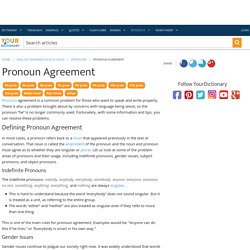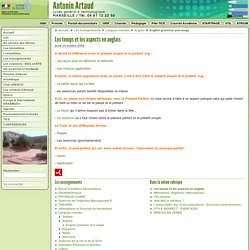

Pronoun Agreement. Pronoun agreement is a common problem for those who want to speak and write properly.

There is also a problem brought about by concerns with language being sexist, so the pronoun “he” is no longer commonly used. Fortunately, with some information and tips, you can resolve these problems. Defining Pronoun Agreement In most cases, a pronoun refers back to a noun that appeared previously in the text or conversation. That noun is called the antecedent of the pronoun and the noun and pronoun must agree as to whether they are singular or plural. Indefinite Pronouns The indefinite pronouns: nobody, anybody, everybody, somebody, anyone, everyone, someone, no one, something, anything, everything, and nothing are always singular.
This is hard to understand because the word “everybody” does not sound singular. This is one of the main rules for pronoun agreement. Gender Issues Gender issues continue to plague our society right now. Subject and Object Pronouns Good Writing Tips Who vs. The effect of this post will affect the rest of your life (okay, maybe not) – Hi there lovelies We know… Dramatic headline!

But the difference between effect and affect can really induce headaches and cause unwanted stress. Which is why we are hoping it to make it a bit easier for you. And we have pictures to make it even easier! (Thanks Google) The first thing you need to know is that affect is a verb (an action word), which means “to influence”. Grammar Girl has a great trick to remember the above information and we wanted to share it with you. R – Ready? A – Affect V – Verb E – Effect N – Noun Ready? And just for fun, here is another cute way to remember this information from SlidePlayer: Aardvark = a very easy noun Affect = Verb, Effect = Noun Like with most things in the English language, there are exceptions to the rules: Affect can be used as a noun in one instance – to describe a facial expression.
As a side note, effect and affect have nothing to do with positive or negative actions or emotions. And there you have it! The Grammar Gorillas. Less or Fewer - Real World Grammar. Verbes irréguliers Anglais: Exercices de révision, aide à l'apprentissage.
LINKWORDS. Les temps et les aspects en anglais - Lycée Antonin ARTAUD. D’abord la différence entre le présent simple et le présent -ing : - une leçon pour se rafraîchir la mémoire - une mise en application Ensuite, la même opposition mais au passé, c’est à dire entre le prétérit simple et le prétérit -ing : - La petite leçon qui va bien - les exercices seront bientôt disponibles ici-même Puis, on passe aux choses sérieuses, avec le Present Perfect.

. - La leçon qui n’arrive toujours pas à entrer dans la tête ; - Un exercice où il faut choisir entre le present perfect et le prétérit simple. Le Futur et ses différentes formes : - Rappel - Les exercices (prochainement) Et enfin, le past perfect qui est, entre autres choses, l’équivalent du plus-que-parfait : Grammar quiz, English and Learning english. Table of-english-tenses. Table of English Tenses Simple tenses THE PAST THE PRESENT THE FUTURE Signal words last ... / ... ago. / .. in 1990 / yest... English grammar. ElementaryTake the pen. Take the pen Skip to content Básico Activity online Compare the following people.

Activity online Compare a CD Rom and and Encyclopedia Personality adjectives PAST SIMPLE. Was or Were? Choose was or were? There was/were. There was/were Worksheet PAST SIMPLE. Flashcards Listen and repeat What are these people doing now? What are they doing? Simple or continuos. Simple or continuous. JClic Write the verbs in the correct form. Do/Does. Write some sentences about these people (3rd person) Replace the underlined words with a pronoun.
Activity on-line Explanation for Spanish speakers Worksheet 1 Activities online 4 Responses to Básico Alessandra Bell 3 noviembre, 2015 at 12:33 Fantastic website with great resources! Deja un comentario Tu dirección de correo electrónico no será publicada. Take the pen · Recursos para la enseñanza del inglés Proudly powered by WordPress · Theme: Pilcrow by Automattic. Gramática inglesa. Nivel básico / English grammar. Elementary.